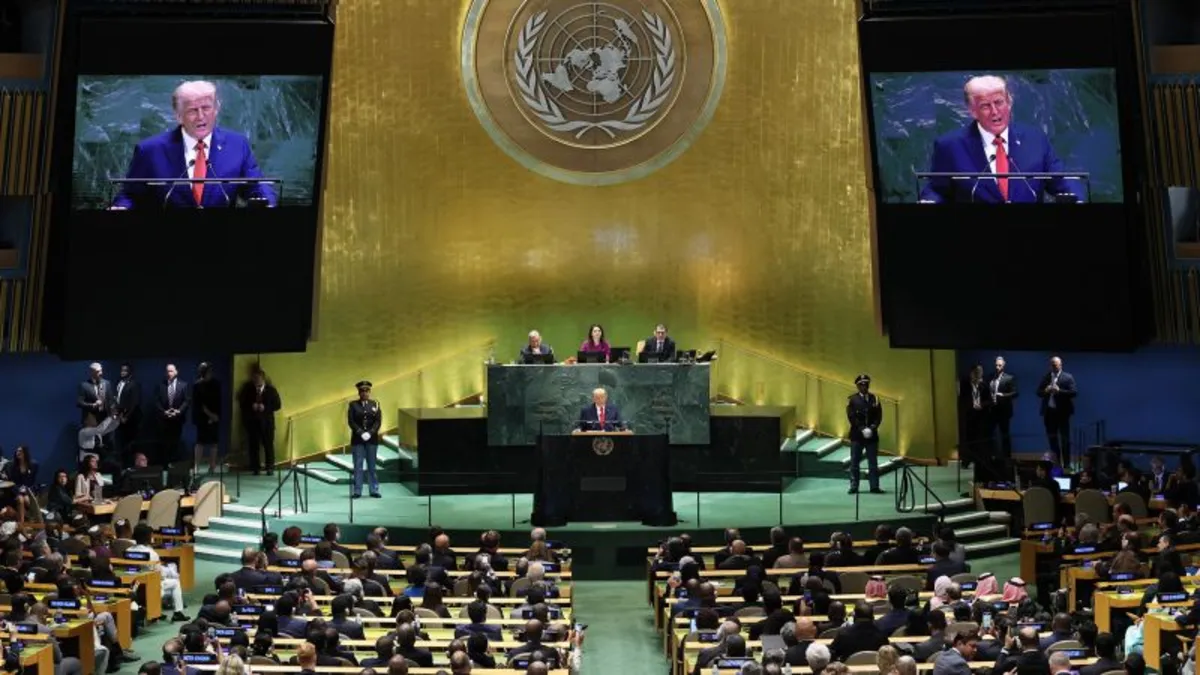
On Tuesday, former US President Donald Trump effectively nominated himself for the Nobel Peace Prize during his address to the United Nations. He boldly asserted that he has “ended seven un-endable wars,” which he described as conflicts where “countless thousands of people [were] being killed.” His proclamation included various historical conflicts such as those in Cambodia, Thailand, Kosovo, Serbia, Congo, Rwanda, Pakistan, India, Israel, Iran, Egypt, Ethiopia, Armenia, and Azerbaijan.
Despite his claims, the two conflicts that Trump has notably focused on—Israel’s war in Gaza and Russia’s war on Ukraine—continue to escalate without any signs of resolution. The myriad deadlines, threats, and promises he has made to secure ceasefire agreements have yet to yield tangible results. Nevertheless, Trump continues to boast about the conflicts he claims to have ended, repeating this narrative since earlier this summer. The White House even provided a list of the seven supposed bilateral agreements last month.
While Trump has played a role in brokering a few agreements between longstanding adversaries, his contributions in some of the other conflicts he claims to have resolved are disputed by key stakeholders involved in those disputes.
Trump's role in the recent peace agreement between Armenia and Azerbaijan is highlighted by his hosting of both leaders at the White House in August. This agreement, originally announced five months prior, aimed to resolve a decades-long conflict over the contested region of Nagorno-Karabakh.
However, the situation escalated dramatically in 2023, when a swift assault enabled Azerbaijan to regain control of the region, causing a mass exodus of ethnic Armenians to Armenia. Both leaders praised Trump for facilitating the agreement, despite his gaffe of confusing Armenia with Albania and mispronouncing Azerbaijan as “Aberbaijan.” While the agreement represents a step forward, it remains unratified, with significant issues—including constitutional changes demanded by Azerbaijan—yet to be resolved.
The longstanding border disputes between Cambodia and Thailand have resulted in repeated violence over the years. Recent escalations in July resulted in the deaths of at least 38 individuals, mostly civilians. Following this outbreak, Trump intervened, threatening to halt trade negotiations unless both countries agreed to a ceasefire. Subsequently, they met in Malaysia and reached a ceasefire agreement, although the underlying territorial conflict remains unresolved. Notably, Cambodia's Prime Minister Hun Manet nominated Trump for the Nobel Peace Prize for his involvement.
In June, Trump announced a ceasefire between Israel and Iran after 12 days of intense fighting, though the situation continued to be volatile. The conflict had escalated following Israeli attacks on Iranian military and nuclear facilities, which prompted retaliatory strikes from Iran. While a ceasefire was eventually endorsed, the absence of a concrete peace agreement and ongoing hostilities raise questions about the effectiveness of Trump's intervention.
In May, tensions between India and Pakistan surged after a series of missile strikes. Trump claimed credit for brokering a ceasefire through social media, but conflicting accounts emerged regarding the negotiations. While Islamabad praised the US for its involvement, India downplayed Trump's role, asserting that the agreement was reached directly between the two nations. India has historically resisted foreign intervention regarding the Kashmir dispute.
When representatives from the Democratic Republic of the Congo (DRC) and Rwanda signed a peace agreement in June, Trump hailed it as a “Great Day for Africa and, quite frankly, a Great Day for the World!” However, the reality on the ground suggests otherwise. Conflicts involving numerous militia groups persist, and recent reports indicate that violence continues unabated in regions like Goma.
The assertion that Trump ended hostilities between Egypt and Ethiopia is questionable, given that the two nations were not engaged in active warfare. Instead, they are embroiled in a contentious dispute over the Grand Ethiopian Renaissance Dam. This massive hydroelectric project has sparked fears of escalating tensions as Egypt argues that it could diminish the Nile's water supply, a claim rooted in a colonial-era treaty.
Another conflict on Trump's list is that of Serbia and Kosovo. Although the two nations signed an economic normalization agreement during Trump's presidency, Serbia still does not recognize Kosovo's independence, which was declared in 2008. Tensions flare periodically, with the European Union playing a crucial mediating role for both nations aspiring to join the bloc.
In conclusion, while Trump’s claims of resolving multiple conflicts may resonate with some, the ongoing violence and unresolved issues in these regions suggest a more complex narrative. As discussions surrounding the Nobel Peace Prize continue, the reality of these conflicts remains far from settled.